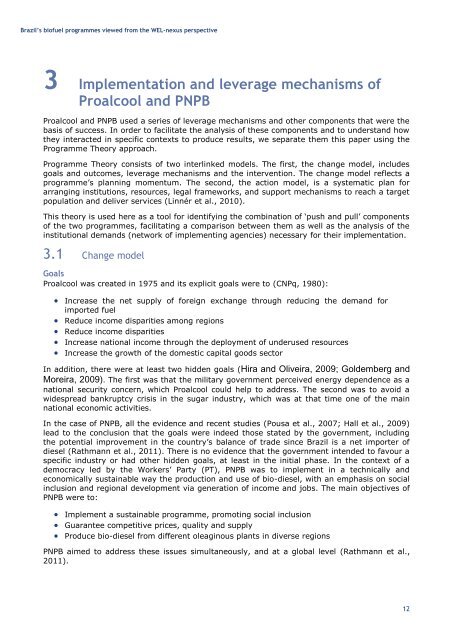Brazil’s biofuel programmes viewed <strong>from</strong> <strong>the</strong> <strong>WEL</strong>-nexus perspective3 Implementation and leverage mechanisms ofProalcool and PNPBProalcool and PNPB used a series of leverage mechanisms and o<strong>the</strong>r components that were <strong>the</strong>basis of success. In order to facilitate <strong>the</strong> analysis of <strong>the</strong>se components and to understand how<strong>the</strong>y interacted in specific contexts to produce results, we separate <strong>the</strong>m this paper using <strong>the</strong>Programme Theory approach.Programme Theory consists of two interlinked models. The first, <strong>the</strong> change model, includesgoals and outcomes, leverage mechanisms and <strong>the</strong> intervention. The change model reflects aprogramme’s planning momentum. The second, <strong>the</strong> action model, is a systematic plan forarranging institutions, resources, legal frameworks, and support mechanisms to reach a targetpopulation and deliver services (Linnér et al., 2010).This <strong>the</strong>ory is used here as a tool for identifying <strong>the</strong> combination of ‘push and pull’ componentsof <strong>the</strong> two programmes, facilitating a comparison between <strong>the</strong>m as well as <strong>the</strong> analysis of <strong>the</strong>institutional demands (network of implementing agencies) necessary for <strong>the</strong>ir implementation.3.1 Change modelGoalsProalcool was created in 1975 and its explicit goals were to (CNPq, 1980): Increase <strong>the</strong> net supply of foreign exchange through reducing <strong>the</strong> demand forimported fuel Reduce income disparities among regions Reduce income disparities Increase national income through <strong>the</strong> deployment of underused resources Increase <strong>the</strong> growth of <strong>the</strong> domestic capital goods sectorIn addition, <strong>the</strong>re were at least two hidden goals (Hira and Oliveira, 2009; Goldemberg andMoreira, 2009). The first was that <strong>the</strong> military government perceived energy dependence as anational security concern, which Proalcool could help to address. The second was to avoid awidespread bankruptcy crisis in <strong>the</strong> sugar industry, which was at that time one of <strong>the</strong> mainnational economic activities.In <strong>the</strong> case of PNPB, all <strong>the</strong> evidence and recent studies (Pousa et al., 2007; Hall et al., 2009)lead to <strong>the</strong> conclusion that <strong>the</strong> goals were indeed those stated by <strong>the</strong> government, including<strong>the</strong> potential improvement in <strong>the</strong> country’s balance of trade since Brazil is a net importer ofdiesel (Rathmann et al., 2011). There is no evidence that <strong>the</strong> government intended to favour aspecific industry or had o<strong>the</strong>r hidden goals, at least in <strong>the</strong> initial phase. In <strong>the</strong> context of ademocracy led by <strong>the</strong> Workers’ Party (PT), PNPB was to implement in a technically andeconomically sustainable way <strong>the</strong> production and use of bio-diesel, with an emphasis on socialinclusion and regional development via generation of income and jobs. The main objectives ofPNPB were to: Implement a sustainable programme, promoting social inclusion Guarantee competitive prices, quality and supply Produce bio-diesel <strong>from</strong> different oleaginous plants in diverse regionsPNPB aimed to address <strong>the</strong>se issues simultaneously, and at a global level (Rathmann et al.,2011).12
Brazil’s biofuel programmes viewed <strong>from</strong> <strong>the</strong> <strong>WEL</strong>-nexus perspectiveOutcomesAmong <strong>the</strong> immediate outcomes expected of Proalcool and PNPB were <strong>the</strong> guarantee of amarket for ethanol and bio-diesel respectively; <strong>the</strong> production and <strong>the</strong> modernisation of <strong>the</strong>existing distilleries in <strong>the</strong> case of Proalcool, and <strong>the</strong> configuration and implementation of aproduction chain for bio-diesel involving different raw materials and different regions of Brazilin <strong>the</strong> case of PNPB. The intermediate outcomes of Proalcool consisted in R&D and <strong>the</strong>production of cars which could run on ethanol, involving car manufacturers, governmentresearch institutions and academia; and <strong>the</strong> ultimate outcome was to have all vehicles runningon pure ethanol. In <strong>the</strong> case of PNPB, <strong>the</strong> ultimate anticipated outcome was <strong>the</strong>implementation of a production chain capable of producing bio-diesel at competitive prices, at<strong>the</strong> same time ensuring social inclusion and regional development.As in most interventions, <strong>the</strong> outcomes of Proalcool and PNPB did not result <strong>from</strong> policiesalone. There was a convergence of group and national interests and values that, toge<strong>the</strong>r,spurred <strong>the</strong> outcomes of Proalcool and <strong>the</strong> current outcomes of PNPB (which is ongoing). Thedevelopment of Brazil’s ethanol production, distribution, transportation system and use by carowners proceeded in a series of incremental, non-linear steps, including reversals and suboptimalchoices (Nardon and Aten, 2008).OutputsThe most important outputs of Proalcool were <strong>the</strong> high government subsidies for <strong>the</strong> ethanolproduction and consumption chain and <strong>the</strong> creation of a market for ethanol with <strong>the</strong> obligatoryinclusion of a percentage of ethanol in <strong>the</strong> gasoline sold in <strong>the</strong> country. There were huge publicinvestments in R&D, along with incentives to <strong>the</strong> private sector to pursue innovation and investin ethanol-related activities. To complete <strong>the</strong> chain, incentives were given to car owners toshift to ethanol-fuelled cars.In general, PNPB outputs were similar, i.e. subsidies for <strong>the</strong> production chain, creation of amarket for bio-diesel by establishing minimum bio-diesel fuel blends, research. The explicitgoal of social inclusion is included <strong>the</strong> creation of <strong>the</strong> Social Fuel Stamp (MDA, 2007).Leverage mechanismsIn both Proalcool and PNPB, <strong>the</strong> primary leverage mechanisms were efforts to create and keepa market for ethanol and bio-diesel, bearing in mind that since <strong>the</strong> 1930s ethanol had in smallproportions been added to gasoline in <strong>the</strong> domestic fuel market as a mechanism for regulatingsugar prices. O<strong>the</strong>r leverage mechanisms were increasing biofuel production in Brazil andfostering technological development in <strong>the</strong> ethanol/bio-diesel sector.According to CNPq (1980), <strong>the</strong>re was no official plan to shape <strong>the</strong> leverage mechanisms ofProalcool in terms of its explicit objectives. On <strong>the</strong> o<strong>the</strong>r hand, PNPB was widely discussedwithin <strong>the</strong> government with <strong>the</strong> participation of several ministries. As a result, <strong>the</strong> leveragemechanisms were well shaped and an action plan involving several areas of <strong>the</strong> governmentwas set.InterventionIn <strong>the</strong> case of Proalcool, <strong>the</strong> intervention was based on a set of subsidies for <strong>the</strong> agroindustrialchain for ethanol production and use, as well as <strong>the</strong> establishment of mandatoryminimum ethanol-gasoline fuel blends.The following items built <strong>the</strong> basis of <strong>the</strong> intervention in <strong>the</strong> case of Proalcool: Guarantee of lower prices for ethanol vs. gasoline at <strong>the</strong> pump by taxing highlypetroleum-based fuels, and as such creating a cross-subsidy whereby gasolineconsumers would pay for part of <strong>the</strong> costs of <strong>the</strong> programme Guarantee of minimal prices for bio-ethanol producers Creation of special credit lines for sugar mills to expand <strong>the</strong>ir capacity Mandatory availability of ethanol at gas stations Maintenance of strategic ethanol stocks to stabilise supply13
















